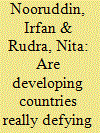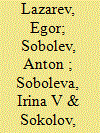|
|
|
Sort Order |
|
|
|
Items / Page
|
|
|
|
|
|
|
| Srl | Item |
| 1 |
ID:
134835


|
|
|
|
|
| Summary/Abstract |
This study evaluates the embedded liberalism hypothesis in a broad swath of less developed countries (LDCs). The authors find that LDC governments pursue a distinct welfare state policy that protects citizens from economic insecurities associated with global market expansion. Specifically, governments use public employment—and particularly employment in civil services and administration—to foster domestic stability alongside market expansion. However, such jobs are targeted to politically salient groups, not poorer groups that might also face increased economic uncertainty postopenness. In turn, public employment shores up public support for openness. The authors' findings suggest that free traders have reasons both to celebrate and to bemoan this LDC embedded liberalism compact. On the positive side, LDC governments are working hard to maintain political support for free trade; on the other hand, the compromise of protecting privileged groups at the expense of others in society raises questions about the long-term sustainability of their strategy.
|
|
|
|
|
|
|
|
|
|
|
|
|
|
|
|
| 2 |
ID:
134834


|
|
|
|
|
| Summary/Abstract |
Why would a national political party that has been competitive for decades collapse overnight? In recent years, parties across Latin America went from being major contenders for executive office to electoral irrelevance over the course of a single electoral cycle. The author develops an explanation that highlights the impact of elite actions on voter behavior. During the 1980s and 1990s leaders across the region implemented policies that were inconsistent with their traditional party brand, provoked internal party conflicts, and formed strange-bedfellow alliances with traditional rivals. These actions diluted the brands of their parties, eroding voters' partisan attachments. Without the assured support of partisans, parties become more susceptible to retrospective voting. Voters who now had no party attachments deserted incumbent parties when they performed poorly. The author tests this interactive hypothesis using matched comparisons of six party-election cases from Argentina and Venezuela.
|
|
|
|
|
|
|
|
|
|
|
|
|
|
|
|
| 3 |
ID:
134837


|
|
|
|
|
| Summary/Abstract |
Scholarship on East European politics expects that party competition in the region is determined by various communist legacies, juxtaposing state-centric authoritarianism to a liberal market economy. Recent empirical evidence, however, uncovers significant variance of party competition patterns across East European countries. To explain this variance, this article argues that an interaction between communist institutional framework and partisan responses to ethnic minorities determines party competition structure in the region. While experience with communist federalism determines partisan affinities with ethnic minorities, tolerance or support for ethnic minorities leads the political actors associated with those minorities to general socially liberal positions. Consequently—and contrary to received knowledge—ethnic politics influence the ideological content of party competition and structure party systems in Eastern Europe.
|
|
|
|
|
|
|
|
|
|
|
|
|
|
|
|
| 4 |
ID:
134838


|
|
|
|
|
| Summary/Abstract |
Communal conflicts, civil wars, and state collapse have led many to portray the notion of African nation-states as an oxymoron. Some scholars of African politics—often referred to as second-generation modernization theorists—have argued that strong ethnic attachments across the continent resulted from rapid economic and political modernization, the very forces credited with reducing parochial ties and consolidating European nations in classic modernization theory. Others have argued that national consolidation in Africa is particularly unlikely due to high degrees of ethnic diversity, colonial rule that exacerbated that diversity, and the partition of cultural groups. Despite the ubiquity of these arguments, there has been very little comparative empirical research on territorial nationalism in Africa. Using individual-level data from sixteen countries, combined with a novel compilation of ethnic group and state characteristics, the author evaluates the observable implications of these long-respected theoretical traditions within a multilevel framework. She finds that attachment to the nation, relative to one's ethnic group, increases with education, urbanization, and formal employment at the individual level, and with economic development at the state level—patterns more consistent with classic modernization theory than with second-generation modernization theory. Thus, if modernization in Africa does indeed intensify ethnic attachment, the impact is overwhelmed by the concurrent increase in panethnic territorial nationalism. Similarly, the results show that ethnic diversity and the partition of ethnic groups by “artificial” state borders increase, rather than decrease, the degree to which individuals identify nationally. Taken together, these results reject pessimistic expectations of African exceptionalism and instead suggest that the emergence of widespread national identification within African states is not only possible but even increasingly likely with greater economic development.
|
|
|
|
|
|
|
|
|
|
|
|
|
|
|
|
| 5 |
ID:
134836


|
|
|
|
|
| Summary/Abstract |
This article aims to explore the microfoundations of political support under a nondemocratic regime by investigating the impact of a natural disaster on attitudes toward the government. The research exploits the enormous wildfires that occurred in rural Russia during the summer of 2010 as a natural experiment. The authors test the effects of fires with a survey of almost eight hundred respondents in seventy randomly selected villages. The study finds that in the burned villages there is higher support for the government at all levels. Most counterintuitively, the rise of support for authorities cannot be fully explained by the generous governmental aid. The authors interpret the results by the demonstration effect of the government's performance.
|
|
|
|
|
|
|
|
|
|
|
|
|
|
|
|
|
|
|
|
|